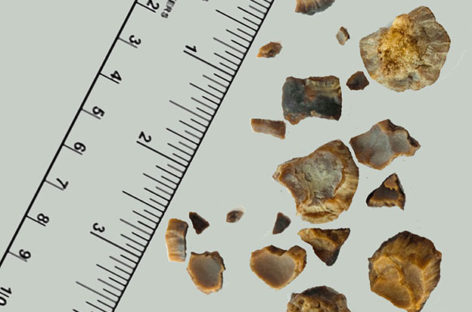Kidney Stones
What is kidney stone?
Urinary Tract Stone, commonly known as Kidney Stone is a hard crystalline substance formed in the kidney or urinary tract.
What causes kidney stones?
- Metabolic Abnormality
- Not drinking adequate amounts of water
- Accumulation of dissolved minerals in the kidney
- Decreased urine output
- Poor diet and lack of exercise- excess red meat, high intake of salt , sugar and fried foods
- Medication or supplements

Types of Stones And Specific Risks
There are different types of kidney stones and each one has its specific risk factors. The most common are:
Calcium Stones
These are the most common type of stones and are made up of calcium oxalate which occurs naturally in various types of food. It is also produced by the liver. Excess of vitamin D, metabolic disorders and intestinal surgery increase the possibility of calcium oxalate build up which may turn into stones.
Cystine Stones
These are caused by a hereditary condition that causes the kidneys to excrete excessive amounts of an amino acid called cystinuria.
Uric Acid Stones
High uric acid levels which lead to stone formation is common among people who do not drink adequate quantities of water or have diets that are high in protein, high consumption of red meat, acidic urine. Genetic factors also influence the likelihood of developing this type of stone.
Struvite Stones
An infection in the urinary tract can cause these stones to form. They develop very quickly and can become very large, often with little or no warning.
Symptoms of presence of kidney stones
- Unbearable pain extending from back to groin areas
- Traces of blood when passing urine
- Vomiting and nausea
- Pus when passing urine
- Decreased urine output
- Burning sensation when urinating
- Persistent urge to urinate
- Fever
- Chills
- Infection
- Metabolic Abnormalities
Also Read: Diet of a Kidney Disease Patient
Book an Appointment
FAQs on kidney stones
- In mild cases, when the stones are small, they could be flushed out with constant hydration and medication as needed.
- Endoscopic stone management (cystoscopy/ ureteroscopy) Lithotripsy – In this treatment, the stone is powdered using laser therapy via natural urinary passage instead of any cuts in the body.
- Smaller Kidney stones can be managed with flexible ureteroscopy. Large stones within the kidney might require percutaneous nephrolithotomy (removing stone through an incision in the back).
- Kidney stones have the chance of re-occurring.
- People who are prone to kidney stones have a higher risk of other kidney problems.
- If not treated adequately or in a timely manner in case of emergency situations it can lead to severe infection needing advance hospital care.
- Drink adequate amounts of fluid (3 to 3.5 liters unless contraindicated)
- Sip water throughout the day
- Consume less oxalate-rich foods
- Maintain a low sodium diet
- Decrease protein rich foods and avoid red meat
- Consult with doctor on calcium supplements
- Exercise
- Avoid Junk Foods
The sooner kidney stones are detected, the sooner treatment can begin. Symptoms include:
- Difficulty in passing urine
- Blood in the urine
- Severe pain that is so bad even sitting still is difficult
- Pain along with nausea and vomiting
- Fever with shivering and chills.
- Frequent Urination



